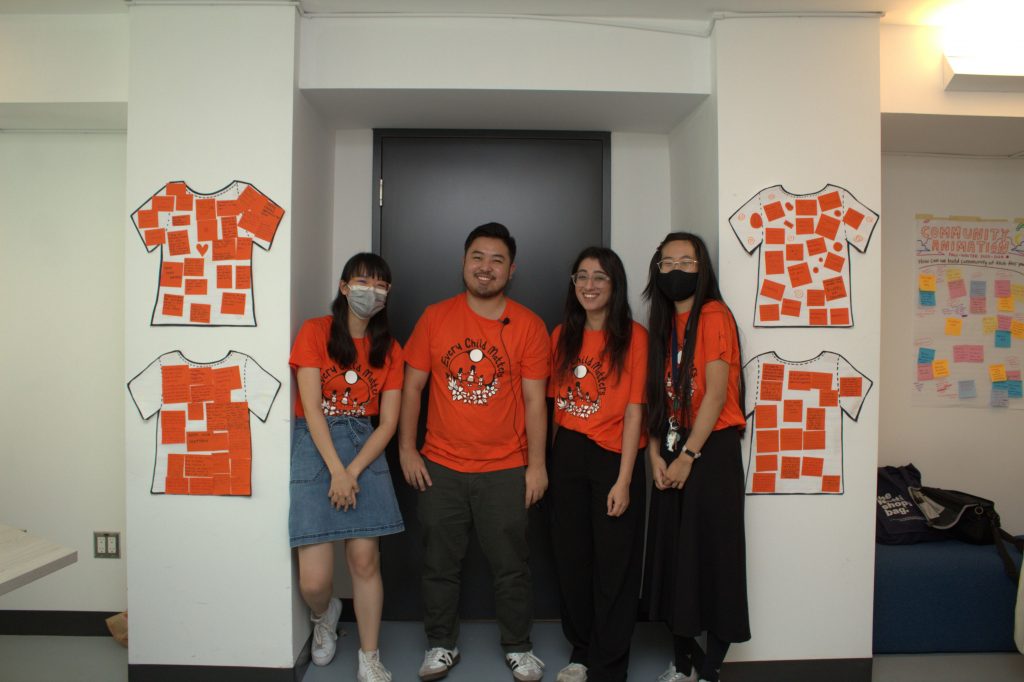
Every year on September 30, we recognize National Truth and Reconciliation Day, commonly known as Orange Shirt Day. On this day, we take the time to spread awareness and reflect upon the intergenerational impacts of Canada’s Residential School System on Indigenous communities.
Written by Lois Lee, Master of Information, Blog Editor and Digital Content Writer
Recognizing Orange Shirt Day
This week, Innovation Hub team members gathered in our co-working space to reflect upon and discuss the importance of Orange Shirt Day. We began by commemorating the story of Phyllis Webstad.
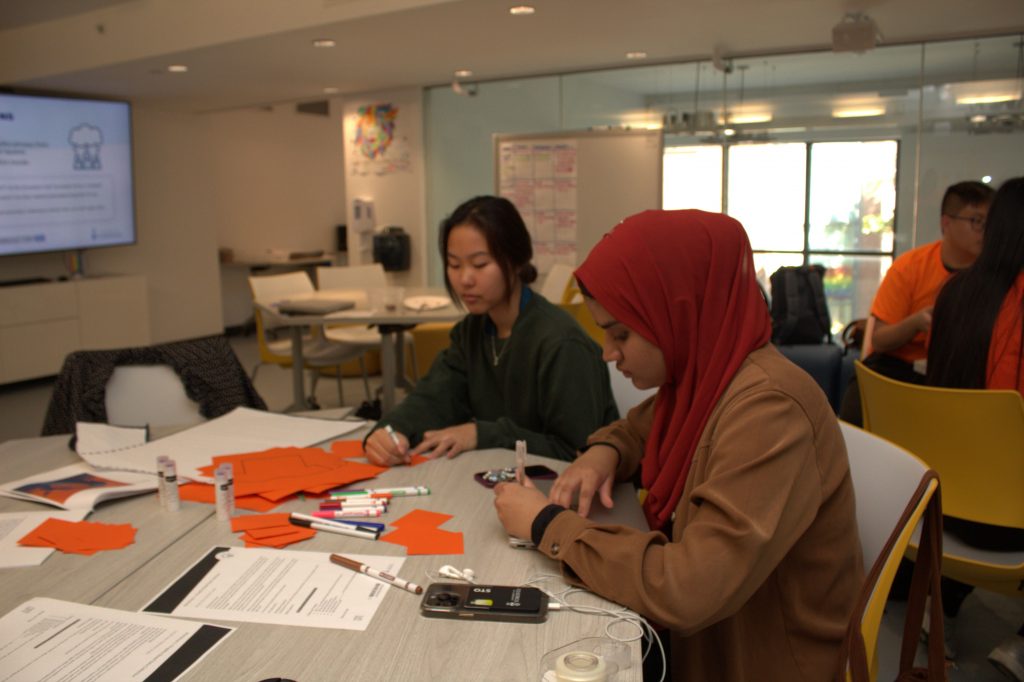
Orange Shirt Day originates from Phyllis Webstad’s experiences as a Secwepemc (Shuswap) woman and residential school survivor. In 1973 when Phyllis was 6 years old, her grandmother took her into town to choose a new outfit for the school year. Phyllis excitedly picked out a shiny, orange shirt to wear to St. Joseph’s Mission Residential School near Williams Lake, BC. However, upon arrival, the Mission immediately confiscated the shirt. For a long time, Phyllis saw the colour orange as a reflection of those experiences and the school’s lack of compassion for children’s feelings.
Phyllis shared this story when the Truth and Reconciliation Commission came to Williams Lake in 2013. The orange shirt then became a symbol of how Indigenous children’s culture and freedom were stripped by the residential school system, inspiring the slogan, “Every Child Matters” to honour its victims.
After taking some time to hear Phyllis’ story, we invited Innovation Hub team members to share any new or existing insights about Orange Shirt Day. One student expressed that they appreciated learning about the story behind Orange Shirt Day from the woman who originally inspired the movement. This is because it added a humanistic layer to our conversations. Another student shared that the beauty of Phylis’ story is embedded in its simplicity and described how focusing on the smaller moments can be more impactful. We wanted to emphasize how important it is to hear from Indigenous voices on Orange Shirt Day because it allows us to intimately resonate with individual stories.
Reconciliation Efforts by U of T
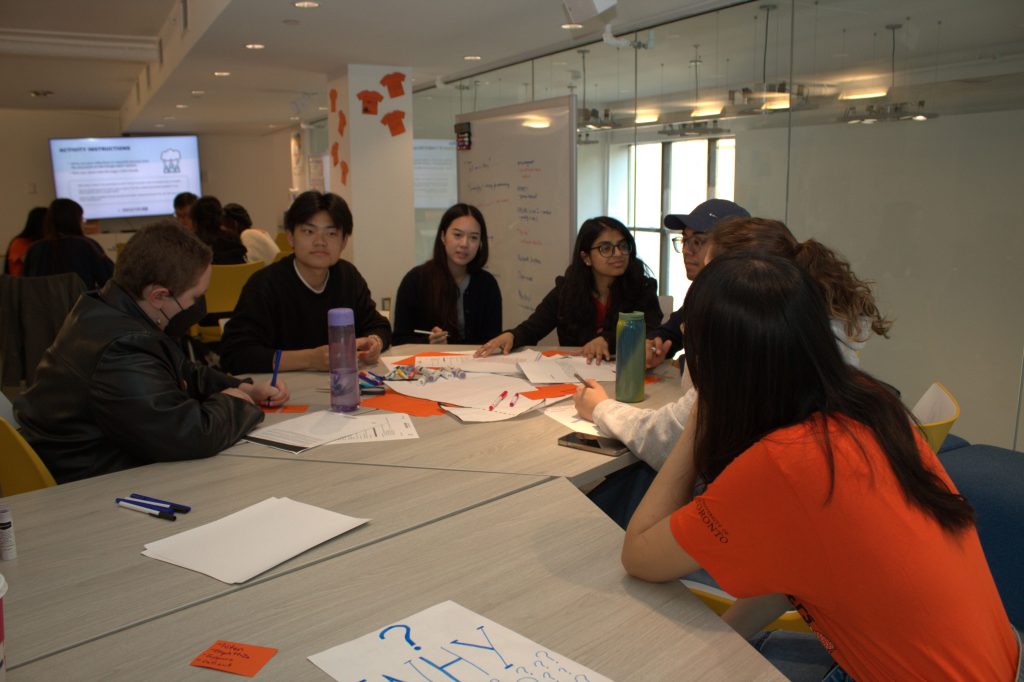
We want to ensure that this day of reflection is also a space for learning. While hearing about Phyllis Webstad, we also took the time to talk about what exactly the “National Day of Truth and Reconciliation” refers to. The Truth and Reconciliation Commission (TRC) of Canada was created in 2007 as part of the Indian Residential Schools Settlement Agreement, which was devoted to fostering reconciliation efforts with former and intergenerational victims. From 2007 to 2015, the TRC travelled all across Canada to hear stories from thousands of witnesses, and to host national events to educate the Canadian public. In December 2015, the TRC released the executive summary of the multi-volume final report of its findings, which includes 94 calls to action for continued reconciliation between Indigenous Peoples and Indigenous allies.
Recognizing that reconciliation must go beyond the scope of the TRC, U of T responded to the National Truth and Reconciliation Commission with The TRC Steering Committee’s Report, Answering the Call. Wecheehetowin. U of T’s Steering Committee, with members consisting of co-chairs, assessors, Elders, faculty and students, created 34 calls to action that address short-term and long-term initiatives. Additionally, the Office of Indigenous Initiatives has annually published the Indigenous Initiatives Annual Progress Report since 2018 in response to U of T’s calls to action. All of these reports are compiled on the Indigenous U of T website.
To consider how we can implement these calls to action into our community, Innovation Hub team members collaboratively participated in a time of reflection. We recognize that we each hold a responsibility to practice Indigenous allyship at U of T and in all of our respective communities, therefore we took time to discuss the following questions:
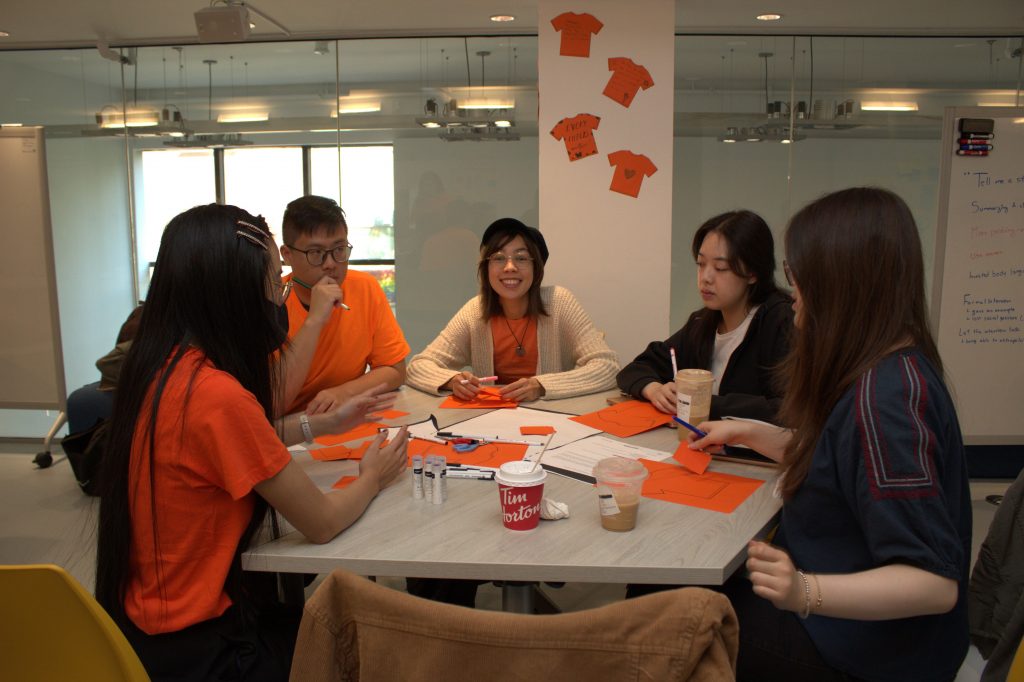
- What does it mean to be good allies at the Innovation Hub and at U of T more broadly? How can we be genuine allies as people living in Canada?
- Reflecting on positionality, how can we use our unique experiences to contribute to reconciliation efforts?
- How do we feel about the UofT’s calls to action? What could be done to support them?
- What changes have been implemented by other Canadian schools and post-secondary institutions? How can UofT learn from these comparators?
Many students reflected on their grade school experiences across various Canadian provinces. Students shared that although the education system has often glossed over Canada’s colonial history, there has also been a gradual shift towards updating curricula because of an elevated awareness about Truth and Reconciliation. Nevertheless, institutions and governments should continue to make this a standardized practice.
International students also reflected on their own experiences with reconciliation. They shared that even though their respective cultures may not have an identical history to Canada’s residential school system, they unpacked insightful parallels about how different cultures and institutions are reconciling with their colonial history.
Collectively, these reflections generated meaningful discussions about how, as allies, it is important for us to stay updated with the calls to action being implemented around us, while continuing to advocate for change. From our discussions, we wrote meaningful phrases on small orange pieces of paper and assembled them into a larger cut-out image of an orange shirt. We hope that this craft will become another visual reminder at the Innovation Hub about our active devotion towards equity, diversity and inclusion, and that our individual efforts are equally significant in a collective effort towards reconciliation.
Looking Beyond Orange Shirt Day
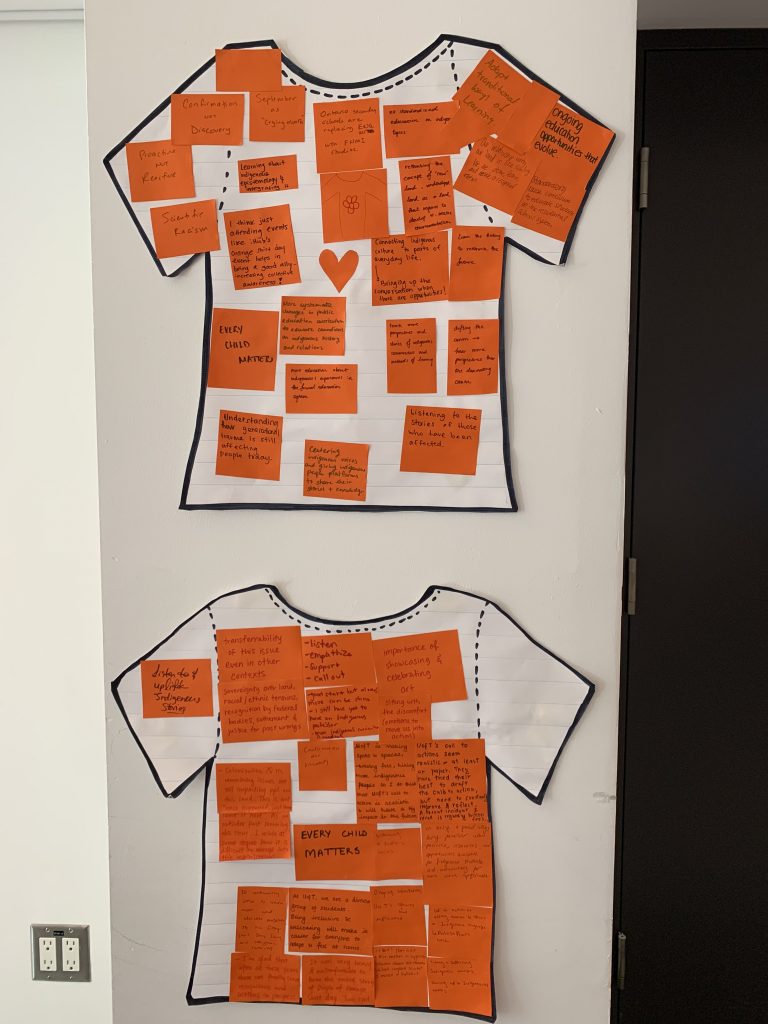
Reconciliation is an on-going process, and we encourage you to continue learning about Orange Shirt Day and broader Indigenous initiatives past September 30th. This will look different for every person, but we hope that you will continue to seek out resources and engage with your community in genuine and meaningful ways.
- Follow this list of Orange Shirt Day resources by The Office of Indigenous Initiatives as a starting point: https://www.utm.utoronto.ca/indigenous/orange-shirt-day-resources
- Read about The Indigenous History of Tkaronto (Toronto): https://guides.library.utoronto.ca/Toronto
- Academic programs at U of T with Indigenous Inquiry: https://studentlife.utoronto.ca/program/academic-programs-with-indigenous-inquiry/
- U of T courses about Indigenous histories and cultures: https://thevarsity.ca/2022/03/27/u-of-t-indigenous-courses/
- Connect with First Nations House Indigenous Student Services: https://studentlife.utoronto.ca/department/first-nations-house/
- Read other reports from The Truth and Reconciliation Commission of Canada: https://nctr.ca/records/reports/
- Attend the imagineNATIVE Film + Media Arts Festival in October: https://imaginenative.org/
References
Answering the Call Wecheehetowin Final Report of the Steering Committee for the University of Toronto Response to the Truth and Reconciliation Commission of Canada. (2017). Steering Committee for the University of Toronto. https://www.provost.utoronto.ca/wp-content/uploads/sites/155/2018/05/Final-Report-TRC.pdf
Calls to Action University of Toronto. (2017). https://www.provost.utoronto.ca/wp-content/uploads/sites/155/2018/05/Final-Report-TRC.pdf
Honouring the truth, reconciling for the future: Summary of the final report of the Truth and Reconciliation Commission of Canada. (2015). Truth and Reconciliation Commission of Canada. https://ehprnh2mwo3.exactdn.com/wp-content/uploads/2021/01/Executive_Summary_English_Web.pdf
Initiatives & Protocols. (n.d.). Indigenous U of T. https://indigenous.utoronto.ca/initiatives-protocols/
Orange Shirt Society (Director). (2021, August 30). Phyllis Webstad—On Orange Shirt Day. https://www.youtube.com/watch?v=EuW4WbekhxY
Truth and Reconciliation Commission of Canada. (2022, September 29). Government of Canada. https://www.rcaanc-cirnac.gc.ca/eng/1450124405592/1529106060525
Truth and Reconciliation Commission of Canada: Calls to Action. (2015). Truth and Reconciliation Commission of Canada. https://ehprnh2mwo3.exactdn.com/wp-content/uploads/2021/01/Calls_to_Action_English2.pdf
0 comments on “Commemorating Orange Shirt Day at the Innovation Hub”